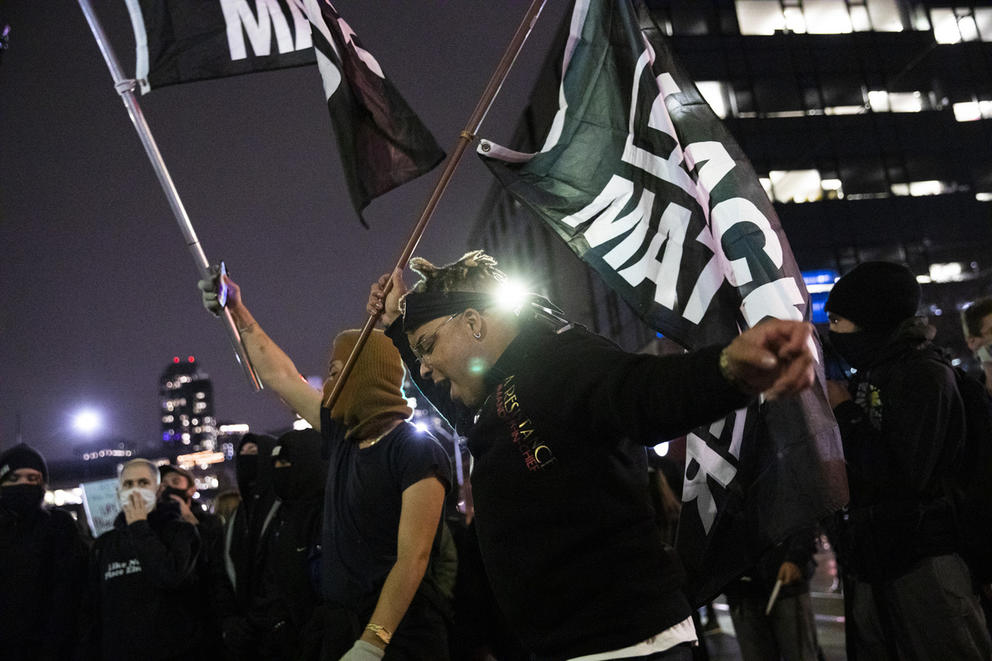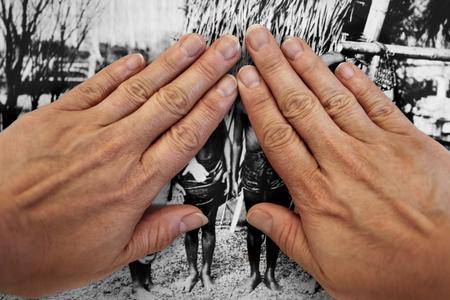Ellis, a Black man, died after a chaotic altercation with the officers on a city street, which took place as he was walking home from a trip to a convenience store to get donuts and water, just after 11 p.m.
Prosecutors have pieced together multiple video and audio recordings to try to tell a story of what happened that night. This evidence shows the officers tackling, restraining, and tasing Ellis. Late in the incident, they also put a fabric “spit hood” over his head. Ellis was declared dead at the scene. The Pierce County medical examiner determined Ellis’ cause of death was lack of oxygen due to physical restraint. An autopsy also showed methamphetamine in his blood and that he had a heart condition.
Ellis’ death occurred less than three months before the murder of George Floyd by a Minneapolis police officer, which triggered widespread protests and a nationwide reckoning over police accountability. Like Floyd, Ellis is heard in recordings in the moments before he died saying he could not breathe.
The case marks the first time police officers will be tried for using deadly force since voters in 2018 approved Initiative 940, which ushered in a package of statewide police reforms – including a lower bar for holding police officers liable for using deadly force and requirements for independent investigations of these incidents. It is also the first time the Washington Attorney General’s Office has criminally charged police officers with unlawfully using deadly force.
Interest in this trial, and its outcome, extends far beyond the city of Tacoma. The Standard spoke with a community activist, a police reform advocate, a state lawmaker, a law enforcement officer, and others who will be tracking it closely to learn why they think people should care about the case. The comments, presented below, have been lightly edited for conciseness and clarity.
John Lovick
John Lovick is a Democratic state senator, retired Washington state trooper, and former Snohomish County sheriff.
The Standard: With the trial getting underway, what will you be watching?
Lovick: I want to just know what the facts are. What they did right, what they did wrong. Was de-escalation applied? How the use of force was applied. I want to know if there are policy changes that are needed, regarding policing. Those are the things that I want to talk about.
Why is this case important and why should people care?
Why should we not care? I don’t know the facts of the case, but Manny Ellis was somebody’s son … He was a man. We should care about how we treat all of us in our community. It’s about the culture and I think we need to talk about what type of a culture in law enforcement we want in our state.
I’ve lived on both sides of the badge and I know I’ve been at both ends of the barrel. I know without a doubt that I have been stopped. And I know when I’ve seen how officers responded with me and my kids in a car, one standing back and I know that that barrel could have come out at any moment. And that hits me really hard.
Jamika Scott
Jamika Scott is a longtime community advocate in Tacoma’s historically Black Hilltop neighborhood who organized against police brutality in the wake of Manny Ellis’ death.
Why is this case important and why should people care?
Scott: Regardless of how you feel about Manny, regardless of how you feel about people with mental illness, regardless of how you feel about cops, the judicial system, how you feel about George Floyd — however you feel about whatever, the one thing you should be doing right now is paying attention to what is happening. This is one of the first instances that’s testing I-940. It’s one of those things where we need as many people’s eyes on it [as possible].
What makes this case different from other cases where officers have gone on trial for deadly use of force?
These three officers being charged doubles the number of officers that have been charged in the state. For a lot of us, this is the first time we’re seeing something on this scale in Washington. So I think that it’s different in the sense that it’s taking place after George Floyd has been killed and the officers who were responsible for that were put on trial. It’s happening after the pandemic, it’s happening after I-940.
Seeing it happen in other places is one thing … It’s a different feeling when it’s happening right in your own backyard.
As this trial gets underway, what will you be watching?
I have a lot of hopes. I think to not get overwhelmed by all the what-ifs, I’m just going to be focusing on what stories are laid out for the jury to consider.
Marco Monteblanco
Marco Monteblanco is president of the Washington State Fraternal Order of Police and a detective with the Kennewick Police Department.
Why is this case important and why should people care?
Monteblanco: We’re very anxious to see that there is a thorough and impartial review of the facts of this case.
Our profession needs to continue to retain and build trust with our local community. That’s first and foremost. And when there are incidents like this it is important to ensure that there is transparency in the investigation and the trial. … Transparency is key. There’s going to be a lot of eyes on this, right? We need to make sure that we continue to trust the judicial system and maintain and build that trust with our community. That’s what the community expects from us. And everybody, both the officers and our community, need to feel that trials like this are transparent and feel comfortable that they come to the right result.
What makes this case different from other cases where officers have gone on trial for deadly use of force?
The similarities between this and other high-profile cases are less important than ensuring that both the officer and the family of Mr. Ellis receive a fair trial.
Sonia Joseph
Sonia Joseph is the board president for the Washington Coalition for Police Accountability and campaigned for I-940.
With the trial getting underway, what will you be watching?
Joseph: Mainly, I’m just watching to see how the process goes because it is the first time that we’ve had a case with an independent prosecutor in our state.
Why is this case important and why should people care?
One, this is the first prosecution under Initiative 940 and the new legal standard, which is whether the use of deadly force was necessary and not just that it was reasonable. Could it have been avoided and should it have been avoided is the key. Two, this is a test of whether we can get an impartial jury in Pierce County for the brutal actions of police officers. And will the jury be able to put aside any of their beliefs that police are infallible?
And three, this will put the issue of substance use on center stage. Police have a duty to protect and care for everyone, even those under the influence of drugs and alcohol. And we are disappointed to see that the defense brings up the notion of excited delirium that has been debunked. And four, an overall accountability. We believe that holding officers accountable can make a difference in how other officers will stop and think before using unlawful force.
What makes this case different from other cases where officers have gone on trial for deadly use of force?
Before 940, we saw only one criminal prosecution, which was acquitted. Also, the Attorney General’s Office is handling the prosecution and not the county prosecutor because of the conflict of interest at the local level.
Monica Alexander
Monica Alexander is the executive director of the Washington State Criminal Justice Training Commission.
With the trial getting underway, what will you be watching?
Alexander: I will be watching everything. It is really important to me from a training perspective, what is called out about training and how we can do better. The officers start at the Criminal Justice Training Commission. We give them a foundation. We don’t, we can’t give them everything. So I will be listening for any and all angles on how these officers are trained. We can all learn from this.
What makes this case different from other cases where officers have gone on trial for deadly use of force?
It is always difficult for everyone involved to go through a trial where officers are being tried. I find it difficult for the police officers doing the work every day to see other officers being tried. I find it difficult for a community to see officers on trial. I find it difficult, period.
David Owens
David Owens is an assistant professor at the University of Washington School of Law, where he directs the Civil Rights and Justice Clinic.
With the trial getting underway, what will you be watching?
Owens: One of the things that I am mindful of is whether or not you sort of get different rules, or application of rules, that usually are interpreted in a way that harm or disfavor criminal defendants, whether or not those rules suddenly are used to empower, at the benefit of the officers in the case.
A rule says one thing on its face, how it’s interpreted is another. … The question is whether or not there are still systemic benefits that police officers have when they are criminal defendants.
Why is this case important and why should people care?
It is extremely rare for officers to be charged with a crime even when they’ve taken the life of another person, even when they’ve committed a civil rights violation. … What this is really about is the level of accountability that we believe is appropriate as a society … This is a good bellwether, for us looking at and evaluating how far we’ve come, or maybe how far we have not come, when it comes to trying to set up systems of accountability.
This story originally was published by the Washington State Standard on Oct. 2, 2023, the day before the start of the trial. Crosscut has edited the first sentence of this story to reflect that the trial of the three Tacoma police officers — Matthew Collins, Christopher Burbank and Timothy Rankine — has started.



